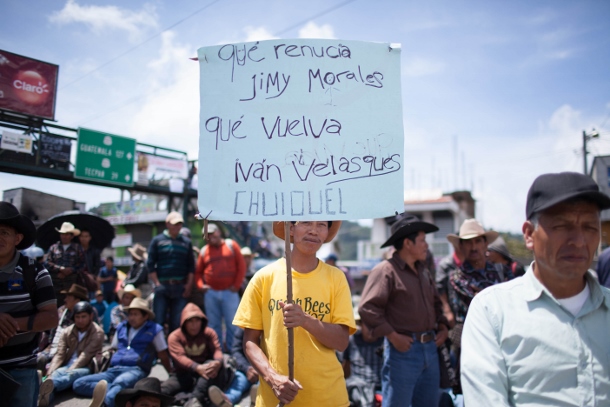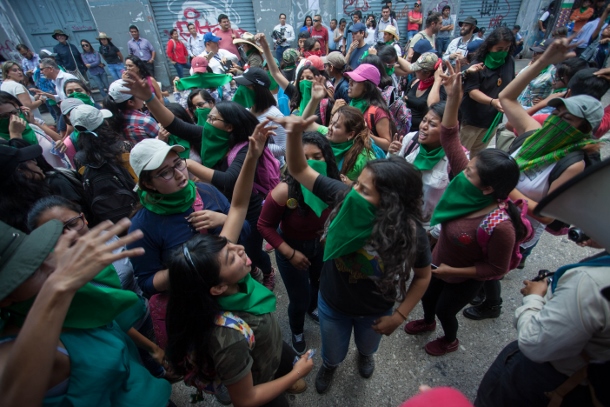
Almost three years to the date after the largest protests against the corruption of Otto Pérez Molina’s administration, Guatemala City’s central plaza is once again the site of protests against corruption. Yet these protests have become all the more important as President Jimmy Morales announced on Aug. 31 the end of the International Commission Against Impunity in Guatemala, or CICIG, which uncovered the graft in the administration of Pérez Molina in 2015.
Morales made the declaration flanked by Vice President Jafeth Cabrera and Minister of Foreign Relations Sandra Jovel, as well as the ministers of the interior, defense and the secretary of intelligence. Behind them stood nearly 60 officials from the Guatemalan military and national police force.
The president gave the anti-corruption body until September 3, 2019 to close their offices and transfer their investigations. The outcry from Guatemalan citizens was almost immediate.
As Morales finished his declaration, protesters quickly returned to the central plaza to reject the president’s decision. Over a thousand protesters braved heavy rains the day after Morales’ announcement, continuing to express their disdain for the expulsion of CICIG. Some protesters brought with them piñatas bearing the likeness of Morales, which were set on fire in effigy.
Yet this was not the end of Morales’ actions against CICIG.
On Sept. 4, Morales announced that he was banning Velásquez from re-entering the country following his trip to the United States to meet with United Nations representatives who were looking to resolve the crisis. In the letter to the National Institute of Migration, Morales accused Velásquez of intending to destabilize “public order and security.”
Activists have worked to raise their voices against the administration to continue to denounce Morales’ decisions. Activists called for a series of actions and protests across the country.
“We have been working and organizing with other organizations,” said Gabriel Wer, one of the founders of Justicia Ya, which emerged during the protests against Pérez Molina in 2015. “We are trying to carry out some type of action that shows that we are not a few people, and that we are against what is occurring in our country. These actions come as a result of the work being done to organize between different organizations in both rural and urban parts of the country.”
The week of actions began on Sept. 10 when tens of thousands of residents of the department of Sololá blocked the Pan American Highway in several places for nearly eight hours to protest Morales’ decision. Members of the Indigenous Municipality expressed concern that corruption would surge and would further impact their communities.
The following day, on Sept. 11, the indigenous government of Totonicapán mobilized another day of roadblocks along the same highway. As the indigenous communities shut down the road, students from the University of San Carlos joined campesino organizations and other activists outside of Congress to protest a series of proposed reforms that would undo anti-corruption efforts within the government.
“We are here to condemn and reject the nefarious congressional members who look to reform the law of impeachment of officials, and to allow officials to annul the decisions of the Constitutional Court,” said Daniel Pascual, the leader of the United Campesino Committee. “We are uniting with the protests that were held in Sololá and Totonicapán to reject the decision of Jimmy Morales to cut the contract with the CICIG and to ban Ivan Velásquez from the country.”

The next day, thousands of campesinos associated with the Campesino Development Committee, the Campesino Committee of the Highlands, and the Union of Campesino Organizations of Verapaz, traveled from across the country to the historic center of Guatemala City to join with urban collectives, religious organizations and residents to show their discontent with the decision by Morales to expel the CICIG.
Tensions were high in the city as the organizations demonstrated in front of the National Palace. The situation was worsened by the presence of hundreds of police and military special forces, known as Kaibiles, which stood guard at the gates that they had established as part of a three-block perimeter to keep protesters from reaching Congress.
Undermining the 2019 election and democracy
Morales’ decision to end the CICIG comes at a critical time in Guatemala, as the preparations for the 2019 presidential election have begun. The undermining of CICIG and the anti-corruption efforts are poised to guarantee the continuation of the cooptation of the state by organized crime.
“They are preparing conditions with these reforms for next year,” Pascual said. “They are trying to reform the law over elections so that politicians can change parties during their terms, which the law prohibits. They are also trying to reform the finance laws. They are trying to protect the president and keep the country subjugated.”
Weeks prior to the announcement ending the CICIG, the commissioner and representatives from the Supreme Electoral Council signed an agreement to work together. The signing ceremony was interrupted by far-right activists, which forced the event to end early.
Former Attorney General Thelma Aldana, who gained recognition for her work to root out corruption in the Guatemalan government, is widely considered to be a potential candidate for the presidency for the newly formed, center-right Semilla Party. Yet Aldana’s critics have taken steps to derail her campaign.
On Sept. 7, Felipe Alejos, a far-right member of congress who faces corruption accusations, established a commission to investigate the purchase of a building for the Guatemalan public prosecutor’s office in Zona 5 of Guatemala City while Aldana was heading the office. Previously, Alejos had traveled to the United States to complain of an ideological bias in the investigations of CICIG and the public prosecutor, something echoed by Morales and other members of the far right.
Yet analysts argue that there is no ideological bias involved in CICIG’s investigations.
“This could not be further from the truth,” said Iduvina Hernández, the director of Security in Democracy, a Guatemala City-based human rights organization. “I see this as being proportional because the right has had power and it has governed for centuries. It is their acts of corruption as a result of being in power that are being investigated. It is not because of their ideology.”

The CICIG is widely viewed by the public as a critical organization in the Guatemala government. Polls have regularly found that the CICIG is one of the most trusted institutions in Guatemala.
The anti-corruption body was established in December 2006 following a request from the Guatemalan government to the United Nations in order to combat impunity. Since its establishment, the CICIG has carried out over 80 investigations into corruption, organized crime and assassinations.
CICIG gained international notoriety in 2015 after an investigation into the criminal network known as La Linea, or The Line, led to the resignations of President Otto Pérez Molina, his Vice President Roxana Baldetti, and the majority of the administration. Pérez Molina and Baldetti both are facing prosecution for orchestrating the criminal network that stole millions of dollars.
The 2015 political crisis was marked by some of the largest protests Guatemala has seen in decades. These protests laid the foundations for the current movement against corruption in the country.
Morales has maintained a hostile relationship with the CICIG since taking office in 2016. The president, who had promised voters he was “neither corrupt nor a thief” has faced three investigations into his 2015 campaign for illicit financing.
In August 2017, Morales attempted to expel Velásquez from Guatemala by declaring him a “persona non grata.” Yet this was overturned by the country’s constitutional court.
In June 2018, the CICIG and public prosecutor’s office requested that Morales lose his immunity so that he could face charges for receiving illicit financing. The country’s Supreme Court deferred to Congress to decide the fate of the president’s immunity.
Declaring Morales “non grata”
The outrage over Morales’ decision quickly spread on social media across the country. This has quickly led to spontaneous organizing to declare Jimmy Morales a “persona non grata” across the country.
“In this moment, there is an spontaneous organized reaction emerging in Quetzaltenango,” said Brenda Hernandez, an activist who was among the first to launch the movement against corruption in 2015.
Morales had traveled to Quetzaltenango on Sept. 7 to inaugurate the Independence Day fair, but he was forced to leave following outcry from residents. During the parade, students carried banners rejecting the president and declaring him unwelcome in Quetzaltenango.
The repercussions for the actions by schools and students came swiftly. The departmental director of the Ministry of Education sanctioned the teachers and students, who in turn argued that their right to freedom of speech was violated.
Yet the example was set, and Morales was quickly declared unwelcome in departments and towns across the country. On Sept. 12, Morales and Vice President Cabrera were declared unwelcome at the University of San Carlos, with the portrait of Cabrera being covered by a black plastic bag. The decision at the university came after pressure from the University Student Association, which made the demand to the Superior University Council.

The current protests come after years of organizing by groups like Justicia Ya and the Campesino Development Committee, as well as the Indigenous Ancestral Authorities, which have managed to bring together the rural and urban social movements.
The internet and social media have been important tools for organizers across Guatemala in the movement against Morales and his administration. But the alliances with rural organizations have also played a key part.
“Since 2015 we have been learning to organize ourselves, largely through social media,” Wer said. “But we have also organized with other organizations, such as students, campesinos and other citizens like us. This allows us to have much larger and diverse actions.”
Building alliances with the rural communities is key for the continuation of the movement.
“One of the things we learned is that from the urban centers we will not achieve anything when the country is primarily rural,” Wer explained. “One of the key means to transform the politics and economy of this country is to build alliances with rural communities.”

Such a amazing post.
thanks
very ncie thanks
Thanks for shating
download & install gamekiller Game Killer v6.01 is best game hacking app with or no root access required to run, download gamekiller app from this official website.
Game Killer v6.01 is best game hacking app with or no root access required to run, download gamekiller app from this official website.